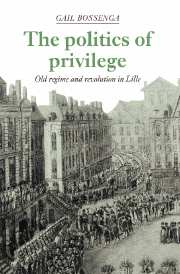Book contents
- Frontmatter
- Contents
- List of figure and tables
- Preface
- List of abbreviations
- 1 Monarchy, privilege and revolution: the problem and setting
- 2 State finance and local privileges
- 3 Corps, bureaucracy and citizenship: the case of the Bureaux des Finances
- 4 The excluded nobility and political representation
- 5 A nation of equals: the demands of the Third Estate
- 6 Uses of a regulated economy: the state against itself
- 7 Corporate privilege and the bourgeoisie
- 8 The abolition of the guilds
- 9 The corporate heritage and the well-ordered state
- 10 Conclusion
- Notes
- Bibliography
- Index
8 - The abolition of the guilds
Published online by Cambridge University Press: 01 October 2009
- Frontmatter
- Contents
- List of figure and tables
- Preface
- List of abbreviations
- 1 Monarchy, privilege and revolution: the problem and setting
- 2 State finance and local privileges
- 3 Corps, bureaucracy and citizenship: the case of the Bureaux des Finances
- 4 The excluded nobility and political representation
- 5 A nation of equals: the demands of the Third Estate
- 6 Uses of a regulated economy: the state against itself
- 7 Corporate privilege and the bourgeoisie
- 8 The abolition of the guilds
- 9 The corporate heritage and the well-ordered state
- 10 Conclusion
- Notes
- Bibliography
- Index
Summary
In the earliest stages of the Revolution, many of Lille's citizens continued to regard political and economic liberalism as unrelated principles. Although democratic representation had become the foundations of the newly constituted nation, the townspeople did not believe that this transformation called into question the existence of the city's guilds. The political changes at the national level did, however, provide a new rationale for challenging the oligarchic structure of these corps. In 1790, three years after a group of retailers were denied the right to elect their own doyens, another group of approximately forty merchants requested the same changes. Like the masters in 1787, these merchants appealed to the “particular statutes of the corps” but they went on to claim that the right to elect officials was “a general principle” and an “imprescriptible right … in accord with reason.” They also drew upon the experience of the Revolution itself. The National Assembly was organizing its administration around the principle of democratic election, and local elections for the town council had demonstrated that the right to vote was essential to good government. Thus, the masters' arguments for direct representation acquired a more universalistic character by appealing to principles that the Revolution had enshrined.
Earlier, Louis Vanhoenacker, Lille's new mayor, had supported the oligarchic organization of the guild. His personal opinion on the new petition is not known, but in 1790 the procureur syndic of the commune and the municipal officers agreed that the right to vote should be extended to all masters. The town council ordered that new elections be held within the guild that month. The extension of the corporate franchise, however, did not affect the guild's economic monopolies. Democratic practices were to exist within a protectionistic guild.
- Type
- Chapter
- Information
- The Politics of PrivilegeOld Regime and Revolution in Lille, pp. 168 - 176Publisher: Cambridge University PressPrint publication year: 1991



